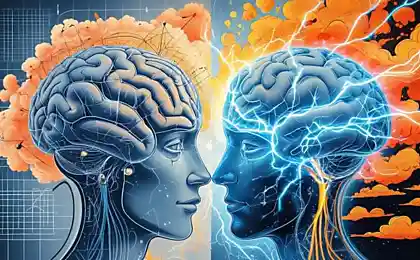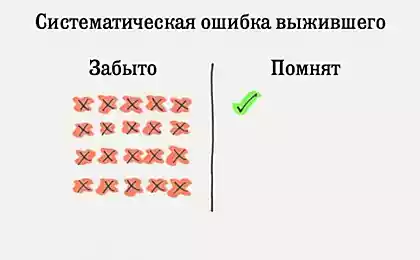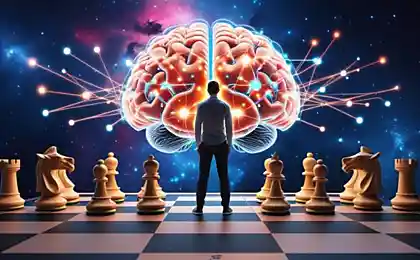653
The 5 most common mental mistakes that lead you away from making the right decisions
For a long time researchers and economists believed that people always make logical, careful decisions. However, over the past decade, scientists have discovered a wide range of mental mistakes that undermined the reputation of our thinking.
From time to time we are able to make the right decisions, but in most cases you do weird, irrational choice, based on their emotions.
Psychologists and researchers of human behavior and love to explore different mental errors. There are so many and each of them has a fancy name like "the simple effect of being in the field of view" or "failed narrative".
Seventy one million four hundred seventy two thousand nine hundred twenty three
We won't go into scientific terms to consider all mental errors and pay attention only to those that most often occur in our lives, and try to explain them in simple to understand language.
Below are the five most common mental errors that lead You away from making the right decisions.
1. Systematic error survivors
Today, almost all popular online media is full of systematic errors, the survivors (eng. survivorship bias). Headlines like "8 things successful people do every day", "the Best advice that ever got Richard Branson" or "How LeBron James trains in the offseason" is a systematic error survivors in action.
Systematic errors relate to the survivors of our tendency to focus on winners in any particular region and learn from them, completely forgetting about all the losers who used the same strategy.
There are thousands of athletes just like LeBron James, but they are unable to make it to the NBA. The problem is that no one has heard of the thousands of athletes who are unable to get to the top.
We only hear about the people who "survived". We erroneously overestimate the strategy, tactics and tips one survivor, ignoring the fact that they do not work for most people.
Another example: "Richard Branson, bill gates and mark Zuckerberg dropped out of school and became billionaires! You don't need school to succeed. Entrepreneurs just need to stop wasting time in studies and take care of business".
Each Branson, gates and Zuckerberg hopes for a few of the thousands of other entrepreneurs who failed, got into debt and left with an unfinished education. Systematic errors of the survivors talking about what we don't know how a particular strategy will manifest itself concretely in our case.
Because the winners are often remembered, and generally forget about the losers, it becomes very difficult to determine whether the success of a particular strategy or not.
Nineteen million seven hundred sixty six thousand two hundred sixteen
2. The fear of loss
The fear of loss (eng. loss aversion) refers to our tendency to strongly avoid losses on the way to acquire profit. The results show that if someone gives You $ 10, You will experience a small increase in satisfaction. But if You lose $ 10, you will experience a much higher loss of satisfaction. Yes, the reaction is opposite but equal in magnitude.
Our tendency to avoid losses leads us to make stupid decisions and change their behavior just to keep the things we already have. We seek to protect things that are and it can cause us to be too to overestimate their, compared to other possible options.
For example, if You buy new shoes, it will bring You a small increase in pleasure. If You have never been able to wear these shoes and decided to sell them after a few months, then this step is likely to be incredibly painful. You never wore them, but for some reason can't part with them. The fear of loss.
Similarly, You may feel a little bit of joy when on the way to work, all the lights will burn for a green light, but if the driver of the car in front of You will hesitate and You will miss the opportunity to slip on a green light, then You will embrace the feelings of anger. The pain of losing is much stronger than the pleasure that arose at the beginning.
3. The availability heuristic
The availability heuristic (eng. availability heuristic) – this is a very common mistake that our brains do, suggesting that the examples easily come to mind are the most important or prevalent things.
The results of a study conducted by Steven Pinker of Harvard University, showed that we live in the least violent time in human history.
Today a lot more people living in the world than ever. Number of murder, rape, sexual harassment and cases of ill-treatment of children has been steadily declining.
Many people are surprised when they hear these statistics. Some still refuse to believe in them. If we live in the most peaceful time in history then why in the world there is so many wars right now? Why every day we hear the news that somewhere someone was killed or raped? Why so often there are acts of terrorism and destruction?
Welcome to the availability heuristic.
The answer lies in the fact that we live in a world where every event becomes known to all. Information about any disaster or crime is widely available as never before. Go online and You will find so much information about the recent events as unlikely to be fit in one issue of the newspaper a hundred years ago.
The total percentage of dangerous events is reduced, but the likelihood is that You will hear about them increases. And because information about these events is always available, our brain believes that they occur with greater frequency than it really is.
We overestimate the influence of what we remember, and underestimate the prevalence of events, about which we heard nothing.
Forty six million five hundred ten thousand nine hundred sixty four
4. The effect of anchor (anchor)
Near my house there is a fast food restaurant that sells delicious burgers with cheese. The menu stated in big letters: "FOR ONE BURGER, you CAN CHOOSE up to 6 TYPES of CHEESE."
My first thought: this is absurd. Who wants to order a Burger with six types of cheese?
Second thought: what are the six types of cheese I would choose?
I wondered what brilliant are the owners of the cafe, until then, until I found out about the effect of anchor (or anchors; eng. anchoring).
You see, ordering a Burger here, I usually chose one type of cheese. But after I read the menu "FOR ONE BURGER, you CAN CHOOSE up to 6 TYPES of CHEESE", my brain attached to what you can order more cheese than usual.
Most people won't have six types of cheese, but this binding is enough to make one piece go to two or three, thus increasing the cost of a Burger for a couple bucks.
This effect is often used in the commercial sphere. For example, businessmen have discovered that if you set a limit, e.g. "12 pieces of product in hands", then people will buy two times more than usual.
But perhaps the most common area where is applied the effect of binding is the pricing. If You see on the watch in the store price tag of $ 500, then deems them too expensive for their budget.
However, if going to the store, You will first see a $ 5,000 watch, then over 500, then the price of the past will seem quite reasonable. Most premium products play a very important role: they allow the products of medium price range to seem cheaper than it really is.
5. The tendency to confirm our point of view
The tendency to confirm our point of view (eng. confirmation bias) is the tendency to seek or to give preference to information that confirms our beliefs, and to ignore or discount the fact that they contradict.
For example, Person A believes climate change is a serious problem, so he seeks out and reads articles and books about environmental conservation, climate change and renewable energy. As a result, A Person continues to confirm and reinforce their current beliefs.
In turn, Person B does not believe that climate change is a serious problem, therefore, searches for and reads only those materials in which climate change is referred to as a myth. As a result, Person B continues to confirm and reinforce their current beliefs.
To change their point of view is not as easy as it seems. The longer You believe in something, the more you ignore and filter all the opposite information.
Eighty four million nine hundred eighty one thousand eight hundred seventy six
Another example. If You have just purchased a Honda Accord, believing it to be the best car on the market, then, of course, will read only those articles that praise the car.
Meanwhile, if You're in some magazine you run across the information that the car of the year was chosen, for example, a Chevrolet Impala, You will reject it, deem it a mistake or find any other excuse.
Most people don't want new information, they tend to confirm what I already know.
Also interesting:
Mental debris of the past
Mistakes never repeat smart people
After reading this article You have any question: how to make the brain not to make these mistakes?
For starters do not think of them as sign that Your brain is not working properly. Think of them as evidence that the labels used by the brain, does not always bring good.
There are many areas of everyday life where mental processes mentioned above are incredibly useful, so don't get rid of them.
The problem is that our brain well enough to perform those functions that we, ultimately, use them in the situations in which they manifest themselves negatively. In such cases, the identity is one of the best solutions to the problem.published
Author: James Clear
P. S. And remember, just changing your mind — together we change the world! ©
Join us in Facebook , Vkontakte, Odnoklassniki
Source: coaching-events.ru/5-samyh-rasprostranyonnyh-mentalnyh-oshibok-kotorye-uvodyat-vas-ot-prinyatiya-pravilnyh-reshenij/
From time to time we are able to make the right decisions, but in most cases you do weird, irrational choice, based on their emotions.
Psychologists and researchers of human behavior and love to explore different mental errors. There are so many and each of them has a fancy name like "the simple effect of being in the field of view" or "failed narrative".
Seventy one million four hundred seventy two thousand nine hundred twenty three
We won't go into scientific terms to consider all mental errors and pay attention only to those that most often occur in our lives, and try to explain them in simple to understand language.
Below are the five most common mental errors that lead You away from making the right decisions.
1. Systematic error survivors
Today, almost all popular online media is full of systematic errors, the survivors (eng. survivorship bias). Headlines like "8 things successful people do every day", "the Best advice that ever got Richard Branson" or "How LeBron James trains in the offseason" is a systematic error survivors in action.
Systematic errors relate to the survivors of our tendency to focus on winners in any particular region and learn from them, completely forgetting about all the losers who used the same strategy.
There are thousands of athletes just like LeBron James, but they are unable to make it to the NBA. The problem is that no one has heard of the thousands of athletes who are unable to get to the top.
We only hear about the people who "survived". We erroneously overestimate the strategy, tactics and tips one survivor, ignoring the fact that they do not work for most people.
Another example: "Richard Branson, bill gates and mark Zuckerberg dropped out of school and became billionaires! You don't need school to succeed. Entrepreneurs just need to stop wasting time in studies and take care of business".
Each Branson, gates and Zuckerberg hopes for a few of the thousands of other entrepreneurs who failed, got into debt and left with an unfinished education. Systematic errors of the survivors talking about what we don't know how a particular strategy will manifest itself concretely in our case.
Because the winners are often remembered, and generally forget about the losers, it becomes very difficult to determine whether the success of a particular strategy or not.
Nineteen million seven hundred sixty six thousand two hundred sixteen
2. The fear of loss
The fear of loss (eng. loss aversion) refers to our tendency to strongly avoid losses on the way to acquire profit. The results show that if someone gives You $ 10, You will experience a small increase in satisfaction. But if You lose $ 10, you will experience a much higher loss of satisfaction. Yes, the reaction is opposite but equal in magnitude.
Our tendency to avoid losses leads us to make stupid decisions and change their behavior just to keep the things we already have. We seek to protect things that are and it can cause us to be too to overestimate their, compared to other possible options.
For example, if You buy new shoes, it will bring You a small increase in pleasure. If You have never been able to wear these shoes and decided to sell them after a few months, then this step is likely to be incredibly painful. You never wore them, but for some reason can't part with them. The fear of loss.
Similarly, You may feel a little bit of joy when on the way to work, all the lights will burn for a green light, but if the driver of the car in front of You will hesitate and You will miss the opportunity to slip on a green light, then You will embrace the feelings of anger. The pain of losing is much stronger than the pleasure that arose at the beginning.
3. The availability heuristic
The availability heuristic (eng. availability heuristic) – this is a very common mistake that our brains do, suggesting that the examples easily come to mind are the most important or prevalent things.
The results of a study conducted by Steven Pinker of Harvard University, showed that we live in the least violent time in human history.
Today a lot more people living in the world than ever. Number of murder, rape, sexual harassment and cases of ill-treatment of children has been steadily declining.
Many people are surprised when they hear these statistics. Some still refuse to believe in them. If we live in the most peaceful time in history then why in the world there is so many wars right now? Why every day we hear the news that somewhere someone was killed or raped? Why so often there are acts of terrorism and destruction?
Welcome to the availability heuristic.
The answer lies in the fact that we live in a world where every event becomes known to all. Information about any disaster or crime is widely available as never before. Go online and You will find so much information about the recent events as unlikely to be fit in one issue of the newspaper a hundred years ago.
The total percentage of dangerous events is reduced, but the likelihood is that You will hear about them increases. And because information about these events is always available, our brain believes that they occur with greater frequency than it really is.
We overestimate the influence of what we remember, and underestimate the prevalence of events, about which we heard nothing.
Forty six million five hundred ten thousand nine hundred sixty four
4. The effect of anchor (anchor)
Near my house there is a fast food restaurant that sells delicious burgers with cheese. The menu stated in big letters: "FOR ONE BURGER, you CAN CHOOSE up to 6 TYPES of CHEESE."
My first thought: this is absurd. Who wants to order a Burger with six types of cheese?
Second thought: what are the six types of cheese I would choose?
I wondered what brilliant are the owners of the cafe, until then, until I found out about the effect of anchor (or anchors; eng. anchoring).
You see, ordering a Burger here, I usually chose one type of cheese. But after I read the menu "FOR ONE BURGER, you CAN CHOOSE up to 6 TYPES of CHEESE", my brain attached to what you can order more cheese than usual.
Most people won't have six types of cheese, but this binding is enough to make one piece go to two or three, thus increasing the cost of a Burger for a couple bucks.
This effect is often used in the commercial sphere. For example, businessmen have discovered that if you set a limit, e.g. "12 pieces of product in hands", then people will buy two times more than usual.
But perhaps the most common area where is applied the effect of binding is the pricing. If You see on the watch in the store price tag of $ 500, then deems them too expensive for their budget.
However, if going to the store, You will first see a $ 5,000 watch, then over 500, then the price of the past will seem quite reasonable. Most premium products play a very important role: they allow the products of medium price range to seem cheaper than it really is.
5. The tendency to confirm our point of view
The tendency to confirm our point of view (eng. confirmation bias) is the tendency to seek or to give preference to information that confirms our beliefs, and to ignore or discount the fact that they contradict.
For example, Person A believes climate change is a serious problem, so he seeks out and reads articles and books about environmental conservation, climate change and renewable energy. As a result, A Person continues to confirm and reinforce their current beliefs.
In turn, Person B does not believe that climate change is a serious problem, therefore, searches for and reads only those materials in which climate change is referred to as a myth. As a result, Person B continues to confirm and reinforce their current beliefs.
To change their point of view is not as easy as it seems. The longer You believe in something, the more you ignore and filter all the opposite information.
Eighty four million nine hundred eighty one thousand eight hundred seventy six
Another example. If You have just purchased a Honda Accord, believing it to be the best car on the market, then, of course, will read only those articles that praise the car.
Meanwhile, if You're in some magazine you run across the information that the car of the year was chosen, for example, a Chevrolet Impala, You will reject it, deem it a mistake or find any other excuse.
Most people don't want new information, they tend to confirm what I already know.
Also interesting:
Mental debris of the past
Mistakes never repeat smart people
After reading this article You have any question: how to make the brain not to make these mistakes?
For starters do not think of them as sign that Your brain is not working properly. Think of them as evidence that the labels used by the brain, does not always bring good.
There are many areas of everyday life where mental processes mentioned above are incredibly useful, so don't get rid of them.
The problem is that our brain well enough to perform those functions that we, ultimately, use them in the situations in which they manifest themselves negatively. In such cases, the identity is one of the best solutions to the problem.published
Author: James Clear
P. S. And remember, just changing your mind — together we change the world! ©
Join us in Facebook , Vkontakte, Odnoklassniki
Source: coaching-events.ru/5-samyh-rasprostranyonnyh-mentalnyh-oshibok-kotorye-uvodyat-vas-ot-prinyatiya-pravilnyh-reshenij/























